Graduate Diploma in Migration Law: Case Analysis & Implications
VerifiedAdded on 2023/04/07
|6
|1135
|383
Report
AI Summary
This report analyzes the case of Ram v Minister for Immigration and Border Protection [2018] FCA 1068, a significant case in Australian migration law. The case concerns the rejection of a visa application based on section 48 of the Migration Act 1958, which relates to previous visa refusals. The report examines the court's decision, which dismissed the appeal and the implications of the ruling, including the retrospective effect of the Act and regulations, and the impact on future visa applications. The report also explores the consequences of lodging an invalid application under the Migration Agents Regulations 1998, focusing on the code of conduct for registered migration agents and the disciplinary actions for non-compliance. The analysis covers key aspects of the case, providing a detailed overview of the legal principles and practical implications for both applicants and migration agents.
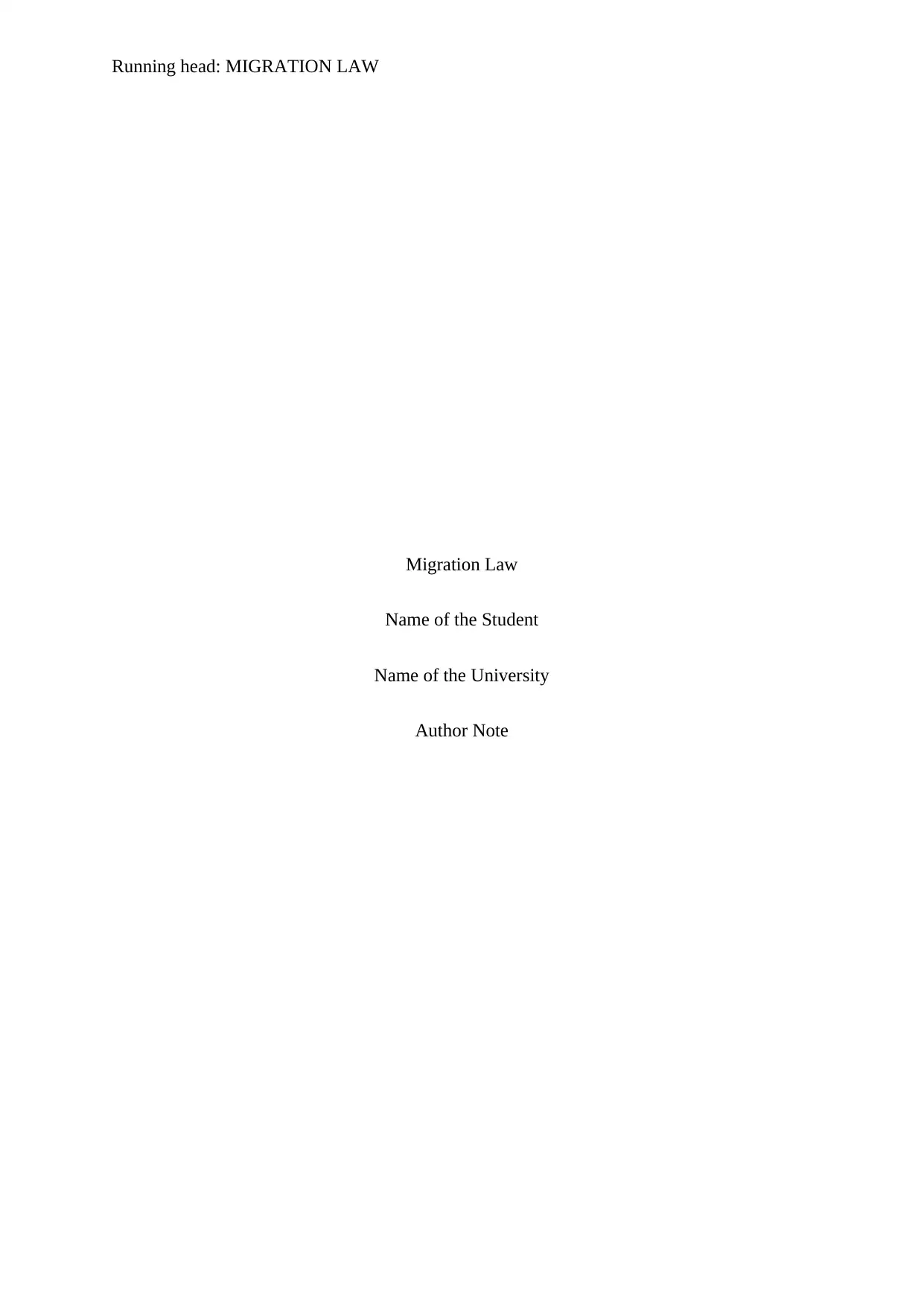
Running head: MIGRATION LAW
Migration Law
Name of the Student
Name of the University
Author Note
Migration Law
Name of the Student
Name of the University
Author Note
Paraphrase This Document
Need a fresh take? Get an instant paraphrase of this document with our AI Paraphraser
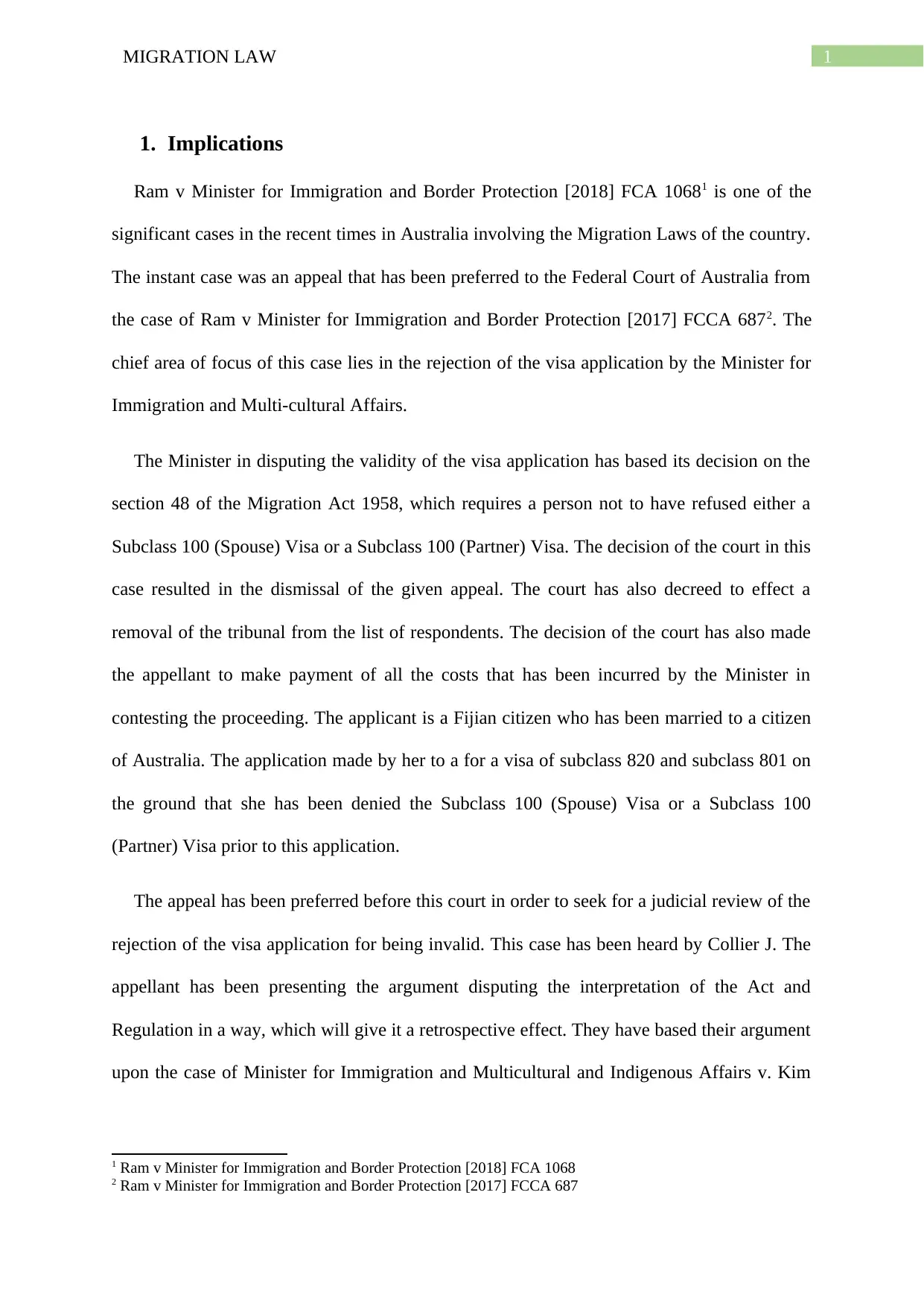
1MIGRATION LAW
1. Implications
Ram v Minister for Immigration and Border Protection [2018] FCA 10681 is one of the
significant cases in the recent times in Australia involving the Migration Laws of the country.
The instant case was an appeal that has been preferred to the Federal Court of Australia from
the case of Ram v Minister for Immigration and Border Protection [2017] FCCA 6872. The
chief area of focus of this case lies in the rejection of the visa application by the Minister for
Immigration and Multi-cultural Affairs.
The Minister in disputing the validity of the visa application has based its decision on the
section 48 of the Migration Act 1958, which requires a person not to have refused either a
Subclass 100 (Spouse) Visa or a Subclass 100 (Partner) Visa. The decision of the court in this
case resulted in the dismissal of the given appeal. The court has also decreed to effect a
removal of the tribunal from the list of respondents. The decision of the court has also made
the appellant to make payment of all the costs that has been incurred by the Minister in
contesting the proceeding. The applicant is a Fijian citizen who has been married to a citizen
of Australia. The application made by her to a for a visa of subclass 820 and subclass 801 on
the ground that she has been denied the Subclass 100 (Spouse) Visa or a Subclass 100
(Partner) Visa prior to this application.
The appeal has been preferred before this court in order to seek for a judicial review of the
rejection of the visa application for being invalid. This case has been heard by Collier J. The
appellant has been presenting the argument disputing the interpretation of the Act and
Regulation in a way, which will give it a retrospective effect. They have based their argument
upon the case of Minister for Immigration and Multicultural and Indigenous Affairs v. Kim
1 Ram v Minister for Immigration and Border Protection [2018] FCA 1068
2 Ram v Minister for Immigration and Border Protection [2017] FCCA 687
1. Implications
Ram v Minister for Immigration and Border Protection [2018] FCA 10681 is one of the
significant cases in the recent times in Australia involving the Migration Laws of the country.
The instant case was an appeal that has been preferred to the Federal Court of Australia from
the case of Ram v Minister for Immigration and Border Protection [2017] FCCA 6872. The
chief area of focus of this case lies in the rejection of the visa application by the Minister for
Immigration and Multi-cultural Affairs.
The Minister in disputing the validity of the visa application has based its decision on the
section 48 of the Migration Act 1958, which requires a person not to have refused either a
Subclass 100 (Spouse) Visa or a Subclass 100 (Partner) Visa. The decision of the court in this
case resulted in the dismissal of the given appeal. The court has also decreed to effect a
removal of the tribunal from the list of respondents. The decision of the court has also made
the appellant to make payment of all the costs that has been incurred by the Minister in
contesting the proceeding. The applicant is a Fijian citizen who has been married to a citizen
of Australia. The application made by her to a for a visa of subclass 820 and subclass 801 on
the ground that she has been denied the Subclass 100 (Spouse) Visa or a Subclass 100
(Partner) Visa prior to this application.
The appeal has been preferred before this court in order to seek for a judicial review of the
rejection of the visa application for being invalid. This case has been heard by Collier J. The
appellant has been presenting the argument disputing the interpretation of the Act and
Regulation in a way, which will give it a retrospective effect. They have based their argument
upon the case of Minister for Immigration and Multicultural and Indigenous Affairs v. Kim
1 Ram v Minister for Immigration and Border Protection [2018] FCA 1068
2 Ram v Minister for Immigration and Border Protection [2017] FCCA 687
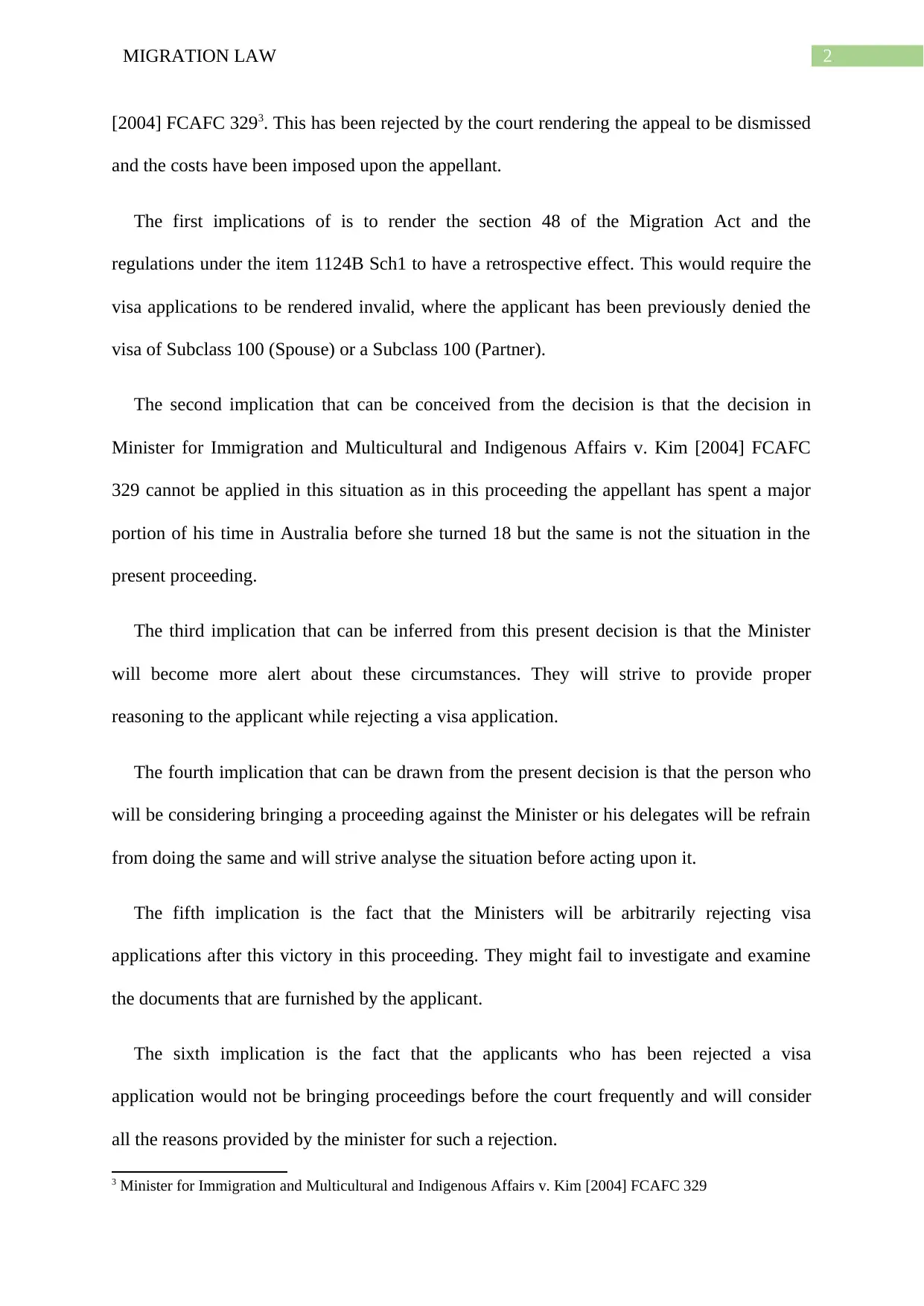
2MIGRATION LAW
[2004] FCAFC 3293. This has been rejected by the court rendering the appeal to be dismissed
and the costs have been imposed upon the appellant.
The first implications of is to render the section 48 of the Migration Act and the
regulations under the item 1124B Sch1 to have a retrospective effect. This would require the
visa applications to be rendered invalid, where the applicant has been previously denied the
visa of Subclass 100 (Spouse) or a Subclass 100 (Partner).
The second implication that can be conceived from the decision is that the decision in
Minister for Immigration and Multicultural and Indigenous Affairs v. Kim [2004] FCAFC
329 cannot be applied in this situation as in this proceeding the appellant has spent a major
portion of his time in Australia before she turned 18 but the same is not the situation in the
present proceeding.
The third implication that can be inferred from this present decision is that the Minister
will become more alert about these circumstances. They will strive to provide proper
reasoning to the applicant while rejecting a visa application.
The fourth implication that can be drawn from the present decision is that the person who
will be considering bringing a proceeding against the Minister or his delegates will be refrain
from doing the same and will strive analyse the situation before acting upon it.
The fifth implication is the fact that the Ministers will be arbitrarily rejecting visa
applications after this victory in this proceeding. They might fail to investigate and examine
the documents that are furnished by the applicant.
The sixth implication is the fact that the applicants who has been rejected a visa
application would not be bringing proceedings before the court frequently and will consider
all the reasons provided by the minister for such a rejection.
3 Minister for Immigration and Multicultural and Indigenous Affairs v. Kim [2004] FCAFC 329
[2004] FCAFC 3293. This has been rejected by the court rendering the appeal to be dismissed
and the costs have been imposed upon the appellant.
The first implications of is to render the section 48 of the Migration Act and the
regulations under the item 1124B Sch1 to have a retrospective effect. This would require the
visa applications to be rendered invalid, where the applicant has been previously denied the
visa of Subclass 100 (Spouse) or a Subclass 100 (Partner).
The second implication that can be conceived from the decision is that the decision in
Minister for Immigration and Multicultural and Indigenous Affairs v. Kim [2004] FCAFC
329 cannot be applied in this situation as in this proceeding the appellant has spent a major
portion of his time in Australia before she turned 18 but the same is not the situation in the
present proceeding.
The third implication that can be inferred from this present decision is that the Minister
will become more alert about these circumstances. They will strive to provide proper
reasoning to the applicant while rejecting a visa application.
The fourth implication that can be drawn from the present decision is that the person who
will be considering bringing a proceeding against the Minister or his delegates will be refrain
from doing the same and will strive analyse the situation before acting upon it.
The fifth implication is the fact that the Ministers will be arbitrarily rejecting visa
applications after this victory in this proceeding. They might fail to investigate and examine
the documents that are furnished by the applicant.
The sixth implication is the fact that the applicants who has been rejected a visa
application would not be bringing proceedings before the court frequently and will consider
all the reasons provided by the minister for such a rejection.
3 Minister for Immigration and Multicultural and Indigenous Affairs v. Kim [2004] FCAFC 329
⊘ This is a preview!⊘
Do you want full access?
Subscribe today to unlock all pages.

Trusted by 1+ million students worldwide
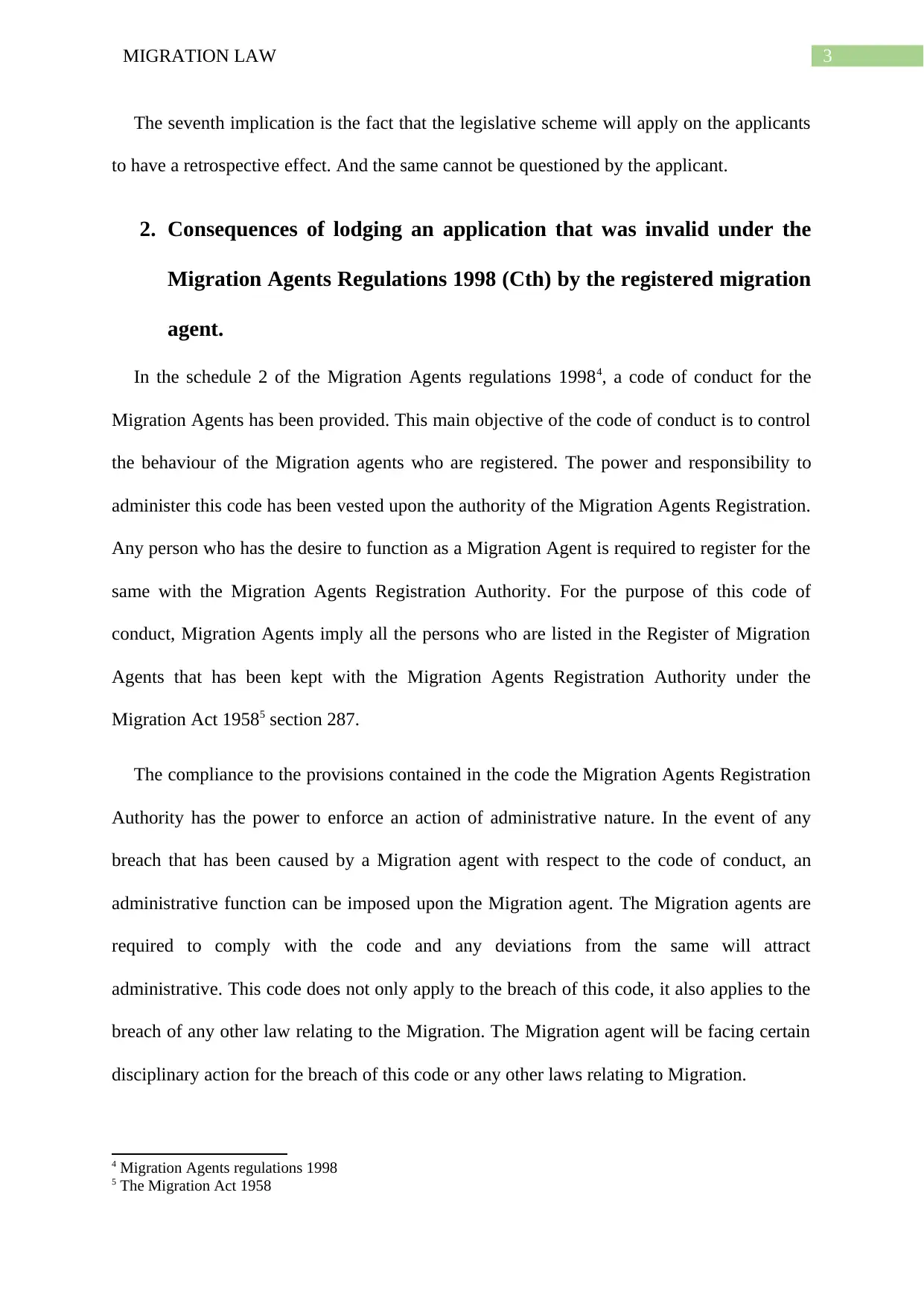
3MIGRATION LAW
The seventh implication is the fact that the legislative scheme will apply on the applicants
to have a retrospective effect. And the same cannot be questioned by the applicant.
2. Consequences of lodging an application that was invalid under the
Migration Agents Regulations 1998 (Cth) by the registered migration
agent.
In the schedule 2 of the Migration Agents regulations 19984, a code of conduct for the
Migration Agents has been provided. This main objective of the code of conduct is to control
the behaviour of the Migration agents who are registered. The power and responsibility to
administer this code has been vested upon the authority of the Migration Agents Registration.
Any person who has the desire to function as a Migration Agent is required to register for the
same with the Migration Agents Registration Authority. For the purpose of this code of
conduct, Migration Agents imply all the persons who are listed in the Register of Migration
Agents that has been kept with the Migration Agents Registration Authority under the
Migration Act 19585 section 287.
The compliance to the provisions contained in the code the Migration Agents Registration
Authority has the power to enforce an action of administrative nature. In the event of any
breach that has been caused by a Migration agent with respect to the code of conduct, an
administrative function can be imposed upon the Migration agent. The Migration agents are
required to comply with the code and any deviations from the same will attract
administrative. This code does not only apply to the breach of this code, it also applies to the
breach of any other law relating to the Migration. The Migration agent will be facing certain
disciplinary action for the breach of this code or any other laws relating to Migration.
4 Migration Agents regulations 1998
5 The Migration Act 1958
The seventh implication is the fact that the legislative scheme will apply on the applicants
to have a retrospective effect. And the same cannot be questioned by the applicant.
2. Consequences of lodging an application that was invalid under the
Migration Agents Regulations 1998 (Cth) by the registered migration
agent.
In the schedule 2 of the Migration Agents regulations 19984, a code of conduct for the
Migration Agents has been provided. This main objective of the code of conduct is to control
the behaviour of the Migration agents who are registered. The power and responsibility to
administer this code has been vested upon the authority of the Migration Agents Registration.
Any person who has the desire to function as a Migration Agent is required to register for the
same with the Migration Agents Registration Authority. For the purpose of this code of
conduct, Migration Agents imply all the persons who are listed in the Register of Migration
Agents that has been kept with the Migration Agents Registration Authority under the
Migration Act 19585 section 287.
The compliance to the provisions contained in the code the Migration Agents Registration
Authority has the power to enforce an action of administrative nature. In the event of any
breach that has been caused by a Migration agent with respect to the code of conduct, an
administrative function can be imposed upon the Migration agent. The Migration agents are
required to comply with the code and any deviations from the same will attract
administrative. This code does not only apply to the breach of this code, it also applies to the
breach of any other law relating to the Migration. The Migration agent will be facing certain
disciplinary action for the breach of this code or any other laws relating to Migration.
4 Migration Agents regulations 1998
5 The Migration Act 1958
Paraphrase This Document
Need a fresh take? Get an instant paraphrase of this document with our AI Paraphraser
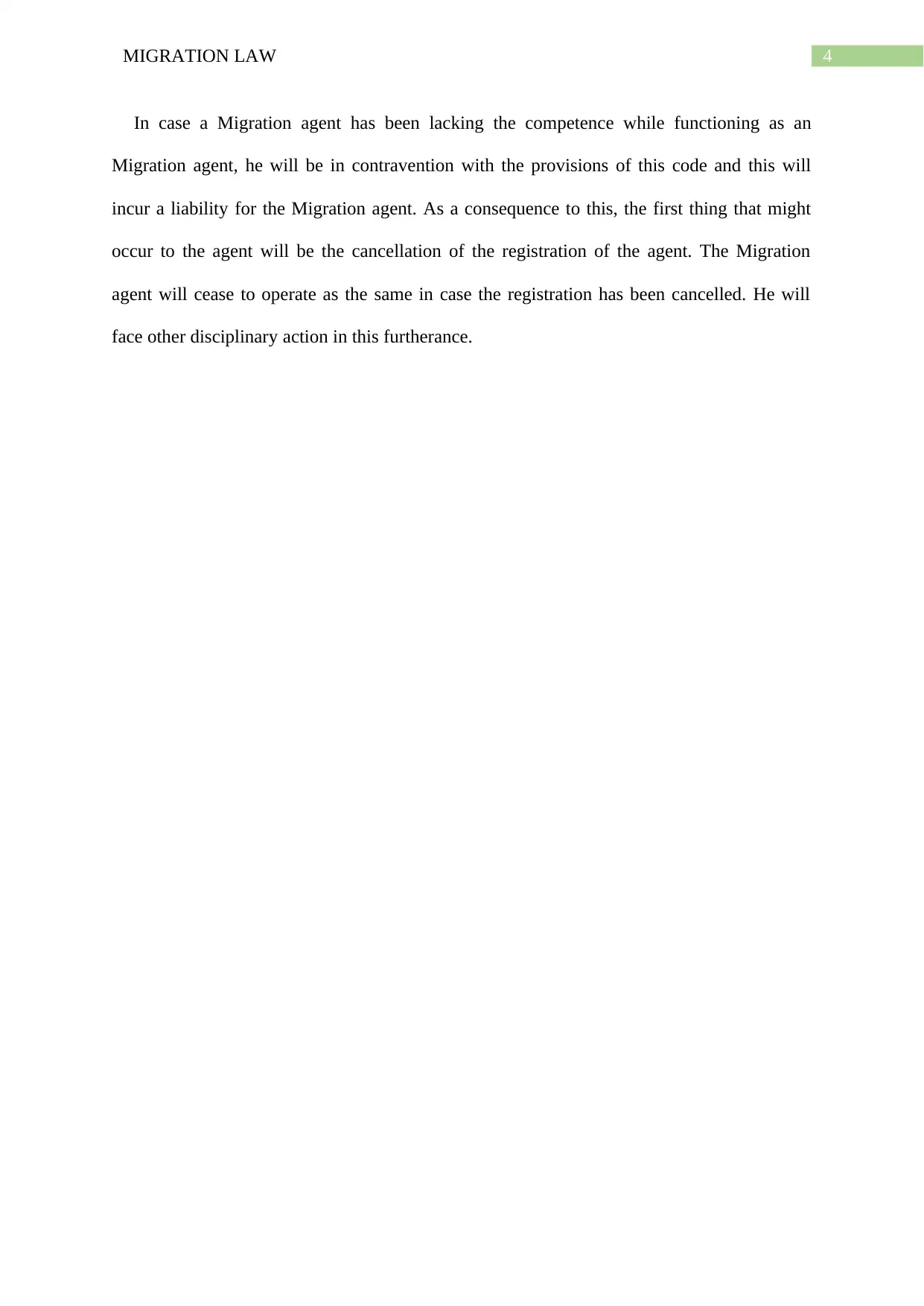
4MIGRATION LAW
In case a Migration agent has been lacking the competence while functioning as an
Migration agent, he will be in contravention with the provisions of this code and this will
incur a liability for the Migration agent. As a consequence to this, the first thing that might
occur to the agent will be the cancellation of the registration of the agent. The Migration
agent will cease to operate as the same in case the registration has been cancelled. He will
face other disciplinary action in this furtherance.
In case a Migration agent has been lacking the competence while functioning as an
Migration agent, he will be in contravention with the provisions of this code and this will
incur a liability for the Migration agent. As a consequence to this, the first thing that might
occur to the agent will be the cancellation of the registration of the agent. The Migration
agent will cease to operate as the same in case the registration has been cancelled. He will
face other disciplinary action in this furtherance.
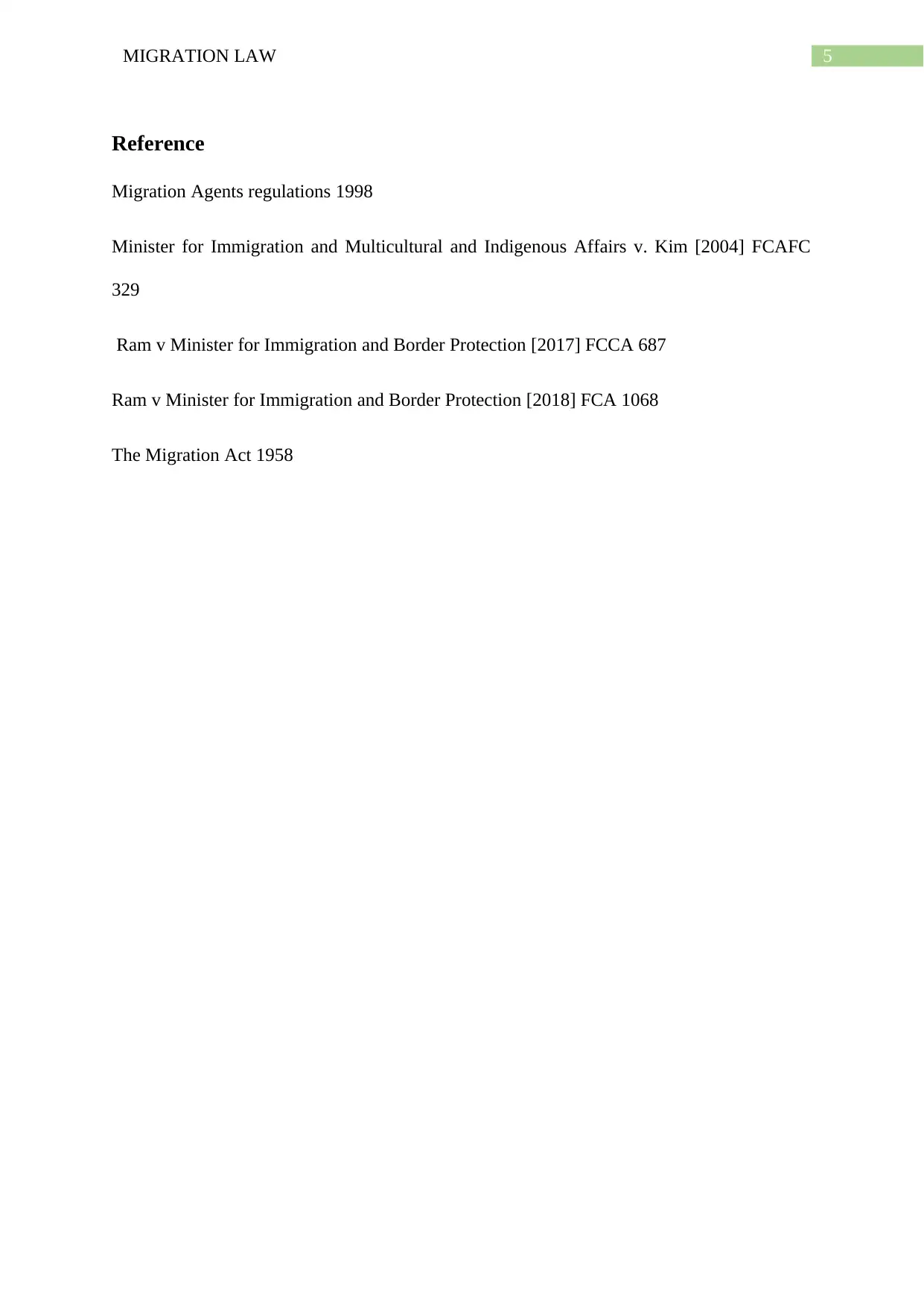
5MIGRATION LAW
Reference
Migration Agents regulations 1998
Minister for Immigration and Multicultural and Indigenous Affairs v. Kim [2004] FCAFC
329
Ram v Minister for Immigration and Border Protection [2017] FCCA 687
Ram v Minister for Immigration and Border Protection [2018] FCA 1068
The Migration Act 1958
Reference
Migration Agents regulations 1998
Minister for Immigration and Multicultural and Indigenous Affairs v. Kim [2004] FCAFC
329
Ram v Minister for Immigration and Border Protection [2017] FCCA 687
Ram v Minister for Immigration and Border Protection [2018] FCA 1068
The Migration Act 1958
⊘ This is a preview!⊘
Do you want full access?
Subscribe today to unlock all pages.

Trusted by 1+ million students worldwide
1 out of 6
Related Documents
Your All-in-One AI-Powered Toolkit for Academic Success.
+13062052269
info@desklib.com
Available 24*7 on WhatsApp / Email
![[object Object]](/_next/static/media/star-bottom.7253800d.svg)
Unlock your academic potential
Copyright © 2020–2026 A2Z Services. All Rights Reserved. Developed and managed by ZUCOL.




